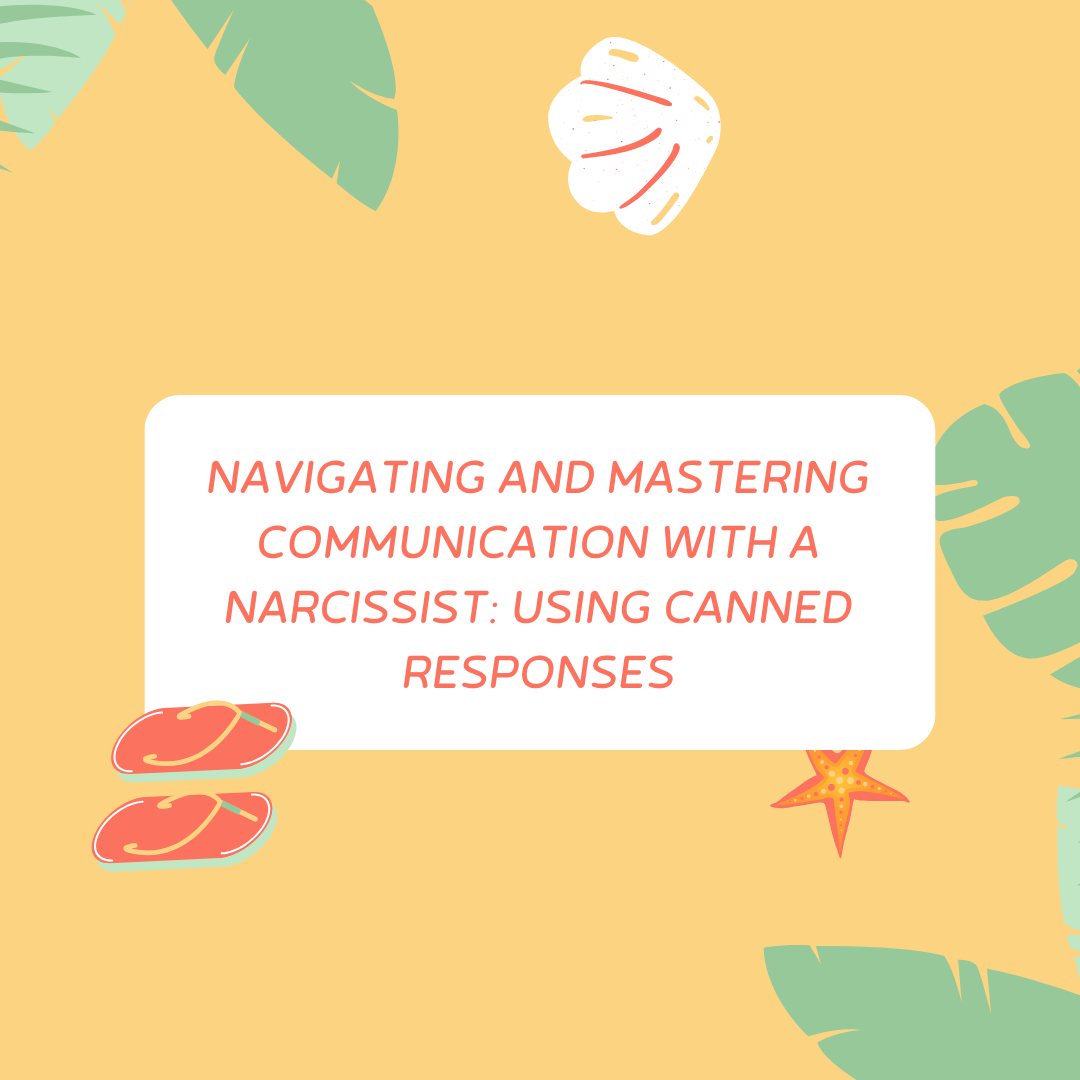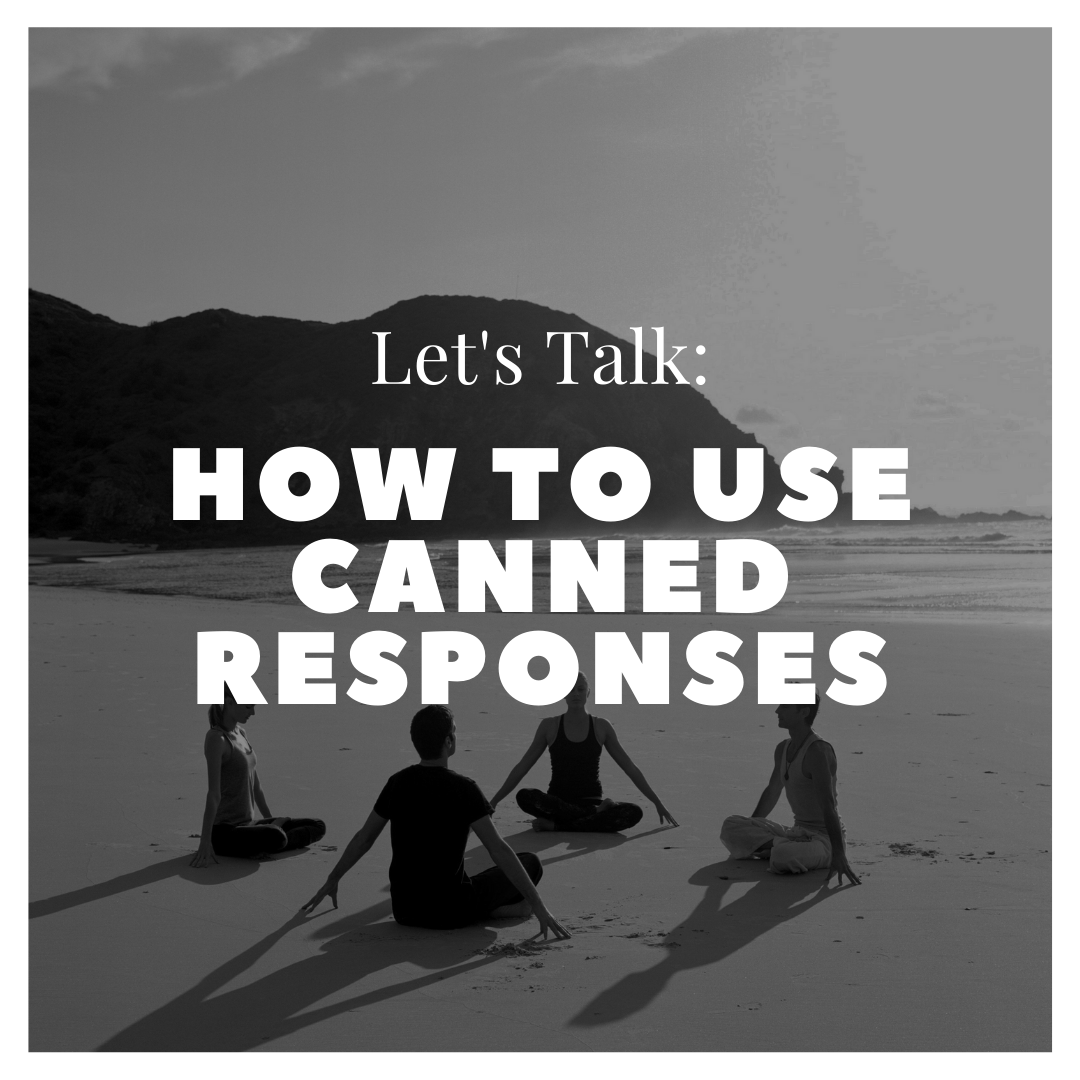Communicating with a narcissist can be disheartening and emotionally draining, especially if you have to do it regularly. Narcissists are known for their inflated sense of self-importance, lack of empathy, and constant need for admiration. Because of this, conversations with a narcissist can often become one-sided, manipulative, and unproductive. There are ways to handle these exchanges more successfully by using canned responses. I use these types of responses when communicating with my ex-husband. As a divorce coach, this is something I teach my clients right away, and I want to share what canned responses are and how to use them to navigate conversations with a narcissist. I will also provide examples and tips on using them in various situations.
What are Canned Responses?
Canned responses are pre-prepared, neutral statements that reduce emotional engagement and distract the conversation from possible conflict or manipulation. I try to keep a few on my desktop that I can cut and paste into messages I send. They can be very helpful when dealing with narcissists. They allow you to keep your boundaries, avoid getting emotionally sucked in, and prevent the conversation from becoming an argument.
Canned responses let you focus on what’s important to you rather than getting caught up in the narcissist’s attempts to control the conversation and make it all about them. It’s important to remember that these responses are not intended to change the narcissist’s behavior but to help you keep control of your emotional well-being during interactions with them.
When I first left my ex-husband, I wanted to change his mind or convince him that what I said was right. I felt I was standing up for myself as I had never done before. I was also becoming emotionally charged like never before. He would send me paragraphs of words that meant nothing but to confuse you. I, in turn, would respond with just as many words about why he was being difficult or trying to negotiate another way to do something. I spent all my time and emotions on something that neither he nor the courts cared about. As time went on and I learned more about narcissists, I learned that my words meant nothing to him and I was wasting my time. That is when I learned about canned responses, saw how well they could work, and saved my sanity.

Examples of Canned Responses and How to Use Them
“I understand that you feel that way.”
This response acknowledges the narcissist’s feelings without agreeing or disagreeing with them. It’s a way to let them know that you’re listening without feeding into their need for validation or argument.
Example situation: The narcissist complains about how everyone is always against them, trying to make you feel sorry for them.
Your response: “I understand that you feel that way.”
“That’s an interesting perspective.”
This response allows you to acknowledge the narcissist’s opinion without agreeing. It can help you avoid engaging in a debate or argument, which is fruitless with a narcissist.
Example situation: The narcissist makes a controversial statement, trying to bait you into an argument.
Your response: “That’s an interesting perspective.”
“I’ll have to think about that.”
This response allows you to remove yourself from a conversation heading towards an argument or manipulation. It signals that you’re unwilling to be drawn into the situation while also showing respect for the narcissist’s opinion.
Example situation: The narcissist tries to pressure you into making a decision that benefits them.
Your response: “I’ll have to think about that.”
“I’m sorry you feel that way.”
This response can help diffuse a situation where the narcissist tries to make you feel guilty or responsible for their feelings. You can maintain boundaries and avoid getting drawn into their drama by expressing empathy without taking responsibility for their emotions.
Example situation: The narcissist blames you for their unhappiness, claiming you don’t care about them.
Your response: “I’m sorry you feel that way.”
“I can see how you might think that.”
This response acknowledges the narcissist’s point of view without agreeing with it. It can help you maintain your position without getting caught up in an argument or conceding to their demands.
Example situation: The narcissist accuses you of being selfish or uncaring because you won’t cater to their every whim or give in to their demands.
Your response: “I can see how you might think that.”
“Thank you for sharing that with me.”
This response is a nice way to acknowledge the narcissist’s input without getting emotionally involved. It allows you to maintain a respectful distance and avoid getting entangled in their drama.
Example situation: The narcissist shares a personal story to elicit sympathy or admiration.
Your response: “Thank you for sharing that with me.”
“I appreciate your concern.”
This response can be helpful when the narcissist tries to control or criticize you under the facade of “helping” or “looking out for the kids.” By expressing gratitude for their concern, you can deflect their attempts at manipulation without getting defensive.
Example situation: The narcissist criticizes your choices or decisions, claiming they know what’s best for you or the kids.
Your response: “I appreciate your concern.”
“I’ll take that into consideration.”
This response shows you’re listening to the narcissist without committing to anything. It’s a way to acknowledge their input without giving them control over your decisions.
Example situation: The narcissist offers unwanted advice, attempting to impose their will on you and the kids.
Your response: “I’ll take that into consideration.”
“I’m not willing to discuss this right now.”
This response sets a boundary and indicates that you’re unwilling to have the conversation. It’s especially useful when the narcissist tries to manipulate or provoke you.
Example situation: The narcissist demands your attention or tries to start an argument when you’re busy or not in the mood to engage.
Your response: “I’m not available to discuss this right now.”

Tips for Using Canned Responses
Stay calm and composed: When using canned responses, it’s important to remain calm and composed. Avoid raising your voice, getting defensive, or showing signs of frustration, as these reactions can fuel the narcissist’s manipulative tactics.
Keep it neutral: Make sure your canned responses are neutral in tone and don’t carry any emotional charge. The goal is to disconnect from the narcissist’s attempts to control the conversation and maintain your emotional well-being.
Be consistent: Consistently using canned responses can help signal to the narcissist that you’re unwilling to engage in their manipulative tactics or attacks. Over time, they may learn that their usual tactics are not working with you.
Don’t expect miracles: Canned responses are not meant to change the narcissist’s behavior, and honestly, I wouldn’t expect them to. Their ultimate goal is to help you maintain your emotional well-being during the times you do have to interact with them.
Set boundaries: Canned responses are just one tool to help you manage conversations with narcissists. It’s also very important to set clear boundaries and make self-care important to keep your emotional health in the face of narcissistic behavior.
Conclusion
Navigating conversations with narcissists can be challenging, but employing canned responses can make these interactions more manageable. Using these neutral, pre-prepared statements, you can maintain your boundaries, protect your emotional well-being, and avoid getting caught up in the narcissist’s manipulative tactics. Remember, the goal is not to change the narcissist’s behavior but to help you maintain your composure and emotional health during your interactions with them.





